|
|
|
Sort Order |
|
|
|
Items / Page
|
|
|
|
|
|
|
| Srl | Item |
| 1 |
ID:
132343
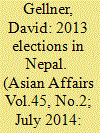

|
|
|
|
|
| Publication |
2014.
|
| Summary/Abstract |
In spite of all the difficulties, the November 2013 elections in Nepal passed off for the most part peacefully and with fewer irregularities than ever before in Nepal. The electoral system was the same as the system used in 2008, with a combination of First Past the Post and Proportional Representation. The results were a defeat for the Maoists, who went from being the biggest single party to the third biggest party. The victors were the two older established parties, the Nepali Congress and the Unified Marxist-Leninists, who seem to have benefitted from the voters dissatisfaction with the Maoists' showing in government. The second big losers in the election were the parties who favoured an ethnic-based solution to Nepal's problems, though the relationship between the Madheshis and the centre remains an unsolved problem.
|
|
|
|
|
|
|
|
|
|
|
|
|
|
|
|
| 2 |
ID:
092362
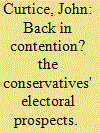

|
|
|
|
|
| Publication |
2009.
|
| Summary/Abstract |
This article assesses whether the Conservatives are likely to be serious contenders for power at the next British general election. First it assesses how well the party will have to do to 'win' the election. Second, it considers whether the record of the polls since 2005 suggests the party is capable of securing the necessary support. Third, the article assesses whether the ideological mood of the electorate has moved closer to the Conservatives since 2005. Finally it considers whether the image of the party has improved.
The Conservatives are likely to have to outpoll Labour by a considerable margin to become the largest party but their record in opinion polls suggests they could achieve this. The ideological mood of the electorate has moved closer to the party, while David Cameron is a relatively popular leader. But the party has still not fully restored its reputation for economic competence.
|
|
|
|
|
|
|
|
|
|
|
|
|
|
|
|
| 3 |
ID:
086783


|
|
|
|
|
| Publication |
2009.
|
| Summary/Abstract |
As the results of the 31 January Iraqi provincial elections have slowly become apparent, the shifting balance of power in local governance is clear. The elections' significance is not immediately evident to external observers, but they are a useful bellwether of political sentiment ahead of national parliamentary elections in 2010. Moreover, the provincial elections will have a substantial impact on the ability of parties and individuals to control local governments and, therefore, rally support ahead of the national poll. Governors and council chairmen can intercede in local economic development and ensure that their allies receive preferential access to jobs and contracts.
|
|
|
|
|
|
|
|
|
|
|
|
|
|
|
|
| 4 |
ID:
094957
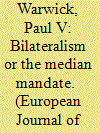

|
|
|
|
|
| Publication |
2010.
|
| Summary/Abstract |
Michael McDonald and Ian Budge have recently advanced an interpretation of democratic governance based on what they term the 'median mandate'. This perspective locates the key element of liberal democracy in a close correspondence between government policy and the policy preferences of the median voter on the left-right scale. The cross-national evidence they produce in favour of this interpretation is impressive, but it largely hinges on a method for measuring the median voter position in each election that relies on the positions of the various parties in the election and the vote shares they received. This article examines the validity of the median mandate hypothesis when median positions are measured more directly from public opinion surveys (particularly, the Eurobarometer and Comparative Study of Electoral Systems series). The findings show that choice between distinct alternatives, rather than conformity to the median, more accurately characterises governance in democratic systems.
|
|
|
|
|
|
|
|
|
|
|
|
|
|
|
|
| 5 |
ID:
197061


|
|
|
|
|
| Summary/Abstract |
It is often assumed that power is exerted through patron–client exchanges in Bangladesh. These patron–client relationships are dispersed and multifaceted, kept together by moral closeness and tenderness. The incumbent government of Bangladesh rigged the last 2014 and 2018 national elections through the clientelist process. In Bangladesh, clientelism has become an art form that encompasses a wide variety of illegal electoral strategies and crimes. Brokers have a crucial part to play in this process because they are responsible for controlling patron–client interactions. Even while clientelism is thought of as an investment in public goods for the underprivileged, it has been demonstrating severe democratic degradation causes in countries that are still in the process of creating their democracies. This study explores how clientelism, broker dominance, and particularly the patron–client situation led Bangladesh to transition from a two-party or multiparty democratic state to a one-party dominant state that is flavored with authoritarian democracy. It also demonstrates how this has led to the emergence of a society in which free and fair election is an illusion.
|
|
|
|
|
|
|
|
|
|
|
|
|
|
|
|
| 6 |
ID:
097024
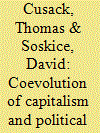

|
|
|
|
|
| Publication |
2010.
|
| Summary/Abstract |
Protocorporatist West European countries in which economic interests were collectively organized adopted PR in the first quarter of the twentieth century, whereas liberal countries in which economic interests were not collectively organized did not. Political parties, as Marcus Kreuzer points out, choose electoral systems. So how do economic interests translate into party political incentives to adopt electoral reform? We argue that parties in protocorporatist countries were "representative" of and closely linked to economic interests. As electoral competition in single member districts increased sharply up to World War I, great difficulties resulted for the representative parties whose leaders were seen as interest committed. They could not credibly compete for votes outside their interest without leadership changes or reductions in interest influence. Proportional representation offered an obvious solution, allowing parties to target their own voters and their organized interest to continue effective influence in the legislature. In each respect, the opposite was true of liberal countries. Data on party preferences strongly confirm this model. (Kreuzer's historical criticisms are largely incorrect, as shown in detail in the online supplementary Appendix.)
|
|
|
|
|
|
|
|
|
|
|
|
|
|
|
|
| 7 |
ID:
100768
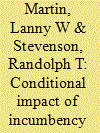

|
|
|
|
|
| Publication |
2010.
|
| Summary/Abstract |
Previous research on coalition politics has found an "incumbency advantage" in government formation, but it has provided no clear explanation as to why this advantage exists. We classify existing theories as either preference-based or institutions-based explanations for why incumbent coalitions might be likely to form again, and we integrate these explanations into a coherent theoretical argument. We also claim that it is possible, to some extent, to distinguish these explanations empirically by taking into account the "historical context" of coalition bargaining. Using a comprehensive new data set on coalition bargaining in Europe, we show that coalitions, in general, are more likely to form if the parties comprising them have worked together in the recent past, and that incumbent coalitions are more likely to re-form if partners have not experienced a severe public conflict while in office together or suffered a recent setback at the polls. The incumbency advantage disappears completely if partners have become mired in conflict or have lost legislative seats (even after accounting for the impact of seat share on coalition size). Moreover, in certain circumstances, institutional rules that grant incumbents an advantage in coalition bargaining greatly enhance their ability to remain in office.
|
|
|
|
|
|
|
|
|
|
|
|
|
|
|
|
| 8 |
ID:
180704
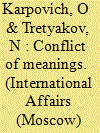

|
|
|
|
|
| Summary/Abstract |
THE RESULTS of the 2020 U.S. presidential elections represent the exact opposite of the outcome hoped for both in the United States and beyond. Rather than shed light on the future of America, its people and its policies, the elections of November 3 effectively plunged the "land of the free" into a chaos of existential uncertainty, deprived Americans of confidence in the future and inflamed the hostility of opposing political forces to the limit.
|
|
|
|
|
|
|
|
|
|
|
|
|
|
|
|
| 9 |
ID:
112122
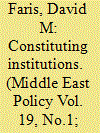

|
|
|
| 10 |
ID:
133126
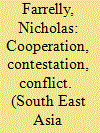

|
|
|
|
|
| Publication |
2014.
|
| Summary/Abstract |
In the period of social and political transformation that followed the election of President Thein Sein, ethnic politics remained a major preoccupation for the Myanmar government, ethnic peoples and the international community. Explaining the varieties of ethnic political interests that are emerging requires a new analytical framework in which the nascent electoral system is given adequate attention. This article argues that cooperation and contestation are now vying with conflict as primary drivers of ethnic politics. To account adequately for the interaction of these concepts, the article introduces various pieces of evidence concerning the different manifestations of ethnic political interests today. It describes an ambiguous situation in which the overall pattern of ethnic politics is changing rapidly. The challenge remains of fully reconciling Myanmar's diverse peoples and including them in one political system.
|
|
|
|
|
|
|
|
|
|
|
|
|
|
|
|
| 11 |
ID:
132037
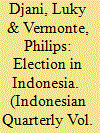

|
|
|
| 12 |
ID:
111609
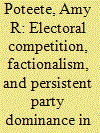

|
|
|
|
|
| Publication |
2012.
|
| Summary/Abstract |
The Botswana Democratic Party (BDP) has maintained a super-majority in the National Assembly for over forty years despite increasingly competitive elections. Several factors contribute to the BDP's continued legislative dominance, including features of the electoral system, fragmentation of the party system, and obstacles to strategic voting behaviour. Factional competition has played a particularly important role. Botswana's political institutions encourage factional competition, and factionalism interacts with the electoral system to hinder consolidation of the party system. Botswana's experience underlines the importance of internal party dynamics and their interaction with features of the electoral and party system in enabling the persistence of legislative dominance in competitive electoral systems.
|
|
|
|
|
|
|
|
|
|
|
|
|
|
|
|
| 13 |
ID:
153320
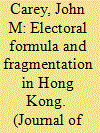

|
|
|
|
|
| Summary/Abstract |
The directly elected representatives to Hong Kong's Legislative Council are chosen by list proportional representation (PR) using the Hare Quota and Largest Remainders (HQLR) formula. This formula rewards political alliances of small to moderate size and discourages broader unions. Hong Kong's political leaders have responded to those incentives by fragmenting their electoral alliances rather than expanding them. The level of list fragmentation observed in Hong Kong is not inherent to PR elections. Alternative PR formulas would generate incentives to form broader, more encompassing alliances. Indeed, most countries that use PR employ such formulas, and the most commonly used PR formula would generate incentives opposite to HQLR's, rewarding broader electoral alliances rather than divisions.
|
|
|
|
|
|
|
|
|
|
|
|
|
|
|
|
| 14 |
ID:
073369
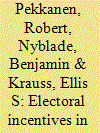

|
|
|
|
|
| Publication |
2006.
|
| Summary/Abstract |
How do electoral incentives affect legislative organization? Through an analysis of Japan's mixed-member electoral system, we demonstrate that legislative organization is strongly influenced not only by the individual legislators reelection incentives but also by their interest in their party gaining power and maintaining a strong party label. Electorally vulnerable legislators are given choice legislative positions to enhance their prospects at the polls, whereas (potential) party leaders disproportionately receive posts with greater influence on the party's overall reputation. Members of Parliament elected from proportional representation (PR) lists and in single member districts also receive different types of posts, reflecting their distinct electoral incentives. Even small variations in electoral rules can have important consequences for legislative organization. In contrast to Germany's compensatory mixed-member system, Japan's parallel system (combined with a "best loser" or "zombie" provision) generates incentives for the party to allocate posts relating to the distribution of particularistic goods to those elected in PR.
|
|
|
|
|
|
|
|
|
|
|
|
|
|
|
|
| 15 |
ID:
073368
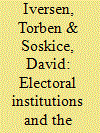

|
|
|
|
|
| Publication |
2006.
|
| Summary/Abstract |
Standard political economy models of redistribution, notably that of Meltzer and Richard (1981), fail to account for the remarkable variance in government redistribution across democracies. We develop a general model of redistribution that explains why some democratic governments are more prone to redistribute than others. We show that the electoral system plays a key role because it shapes the nature of political parties and the composition of governing coalitions, hence redistribution. Our argument implies (1) that center-left governments dominate under PR systems, whereas center-right governments dominate under majoritarian systems; and (2) that PR systems redistribute more than majoritarian systems. We test our argument on panel data for redistribution, government partisanship, and electoral system in advanced democracies.
|
|
|
|
|
|
|
|
|
|
|
|
|
|
|
|
| 16 |
ID:
192848
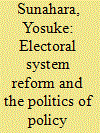

|
|
|
|
|
| Summary/Abstract |
As women’s participation in the workforce expands, many countries seek to reform child care support by changing the gender division of labor. Japan also attempted universalistic child care support reforms, though these were not always successful. The electoral reforms of the 1990s prompted the major political parties to make universalistic reforms, and the major party leaders advocated similar ideas. Still, they failed to extend benefits to all children. Agreement on the expansion of funding was particularly challenging. By analyzing coalition formation within and among political parties, I show that the electoral reform led to stiff competition, which made it difficult for parties to agree. The change to a majoritarian electoral system not only intensified inter-party rivalry but also made it difficult to persuade intra-party groups that perceived a threat to their electoral success.
|
|
|
|
|
|
|
|
|
|
|
|
|
|
|
|
| 17 |
ID:
174452
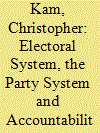

|
|
|
|
|
| Summary/Abstract |
Electoral accountability requires that voters have the ability to constrain the incumbent government’s policy-making power. We express the necessary conditions for this claim as an accountability identity in which the electoral system and the party system interact to shape the accountability of parliamentary governments. Data from 400 parliamentary elections between 1948 and 2012 show that electoral accountability is contingent on the party system’s bipolarity, for example, with parties arrayed in two distinct blocs. Proportional electoral systems achieve accountability as well as majoritarian ones when bipolarity is strong but not when it is weak. This is because bipolarity decreases the number of connected coalitions that incumbent parties can join to preserve their policy-making power. Our results underscore the limitations that party systems place on electoral reform and the benefits that bipolarity offers for clarifying voters’ choices and intensifying electoral competition.
|
|
|
|
|
|
|
|
|
|
|
|
|
|
|
|
| 18 |
ID:
126130
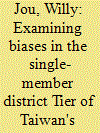

|
|
|
|
|
| Publication |
2013.
|
| Summary/Abstract |
Two elections to the Legislative Yuan have been held under a mixed parallel system. While there have been criticisms that this new set of rules leads to a considerable disparity between parties' vote and seat shares in the district tier, in so far as the new electoral system has been accepted and therefore treated as given by both parties and voters, its fairness should be assessed not by the degree of proportionality, but rather by examining various sources of potential bias. These include differences in electorate sizes and turnout rates across districts, and the efficiency by which votes for the main parties' candidates are distributed. The present study investigates how "fair" the functioning of Taiwan s new mixed parallel system was in the 2008 and 2012 legislative elections by simulating equal and reverse vote scenarios at the district level, and measuring the magnitude of each component of electoral bias. The results show that the operation of the electoral system entails no marked partisan bias, since it does not consistently confer an advantage to either of the main parties or camps.
|
|
|
|
|
|
|
|
|
|
|
|
|
|
|
|
| 19 |
ID:
105386
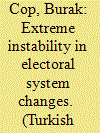

|
|
|
|
|
| Publication |
2011.
|
| Summary/Abstract |
This article examines the extremely volatile character of electoral system changes that took place in Turkey from the end of the Second World War up until the end of the 1990s. Motives that drove these changes were either related to intentions to prevent the undesirable repetition of the past circumstances, or to political actors' short-term goals. Some of these changes seem to have reached their objectives while some others have not. The volatility in electoral institutions' design was also strongly associated with the fluctuations Turkey experienced in terms of democratic consolidation. In this respect, the Turkish case may offer a variety of useful empirical material for the prospective designers of new institutions in a number of former communist countries that are likely to experience further stages of democratic transition/consolidation in the years ahead.
|
|
|
|
|
|
|
|
|
|
|
|
|
|
|
|
| 20 |
ID:
119580
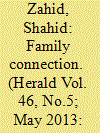

|
|
|
|
|
|
|
|